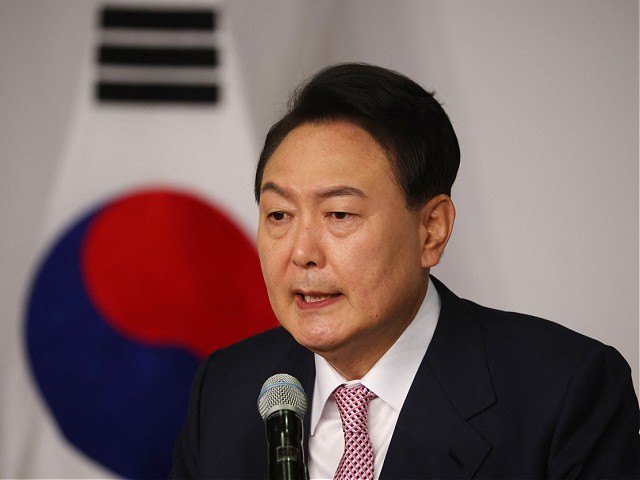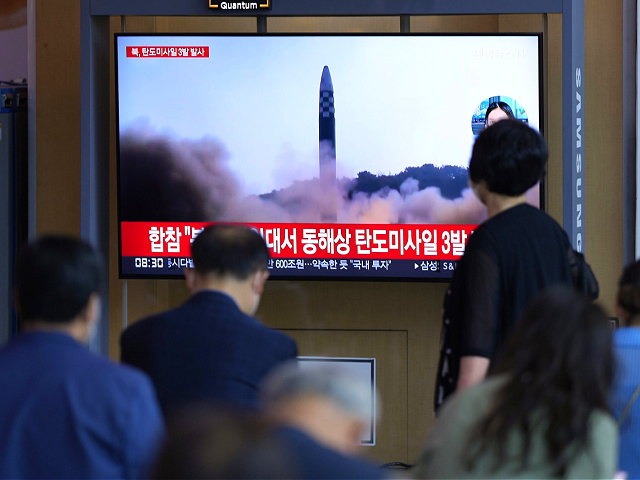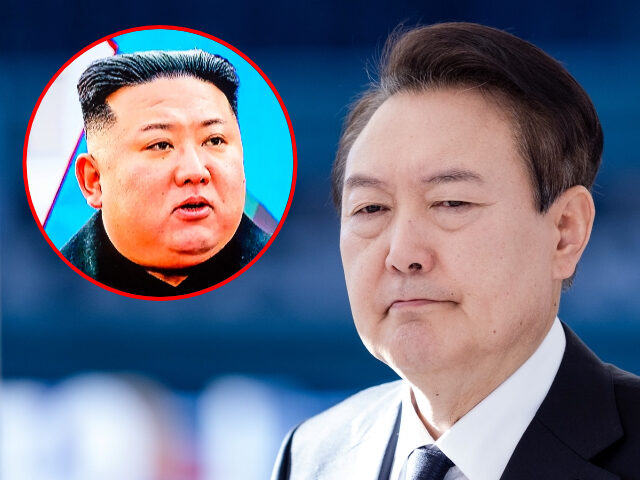The president of South Korea, Yoon Suk-yeol, suggested this week that his country could “possess its own nukes” in response to North Korea’s incessant — and escalating — threats against Seoul.
The remark shocked and alarmed many in the Western world but followed a similarly striking declaration by North Korean communist dictator Kim Jong-un in the new year that North Korea would pursue an “exponential increase” in the number of nuclear weapons it possesses in 2023.
Yoon’s suggestion was meant to address a “worst-case scenario” and not to announce an immediate intention to pursue nuclear weapons development, his presidential office later clarified. The country possessing its own nuclear weapons arsenal is an extremely popular position in South Korea, years of polling have shown, that has only increased in popularity as South Koreans grow fearful of belligerent military activity by North Korea’s top ally, China. China is formally a nuclear state, while North Korea possesses an illegal nuclear weapons arsenal it regularly threatens to use against South Korea and America.
South Korea and North Korea are technically at war. Their allies, China and America, are also technically at war, as neither side in the Korean War has signed a peace treaty. The Korean War began in 1950 and active hostilities ended with an armistice treaty in 1953.
Yoon, a conservative who narrowly won the election last year, was discussing military preparedness during briefings with his Foreign Affairs and Defense Ministries on Wednesday when he raised the issue of nuclear weapons development.

FILE – South Korea’s president-elect Yoon Suk-yeol speaks during a news conference at the National Assembly in Seoul, South Korea on March 10, 2022. (Kim Hong-ji/Pool Photo via AP, File)
“The Republic of Korea could deploy tactical nuclear weapons or possess its own nukes,” the South Korean news outlet Yonhap reported Yoon as saying. Yoon reportedly added that the immediate manufacture of nuclear weapons was “unrealistic,” but if Seoul needed them, “it won’t take long for us to have one, given our scientific and technological capabilities.”
A presidential office spokesman told reporters on Thursday in response to the firestorm caused by the remarks that Yoon was merely “stating his firm commitment amid the escalating threat of North Korea’s nuclear weapons.”
“The most important part of his comments yesterday was that, as a realistic measure at the moment, it’s important to effectively strengthen extended deterrence within the security alliance between South Korea and the United States,” the official insisted, according to a translation by Yonhap. “However, when it comes to security, the worst-case scenario must always be taken into consideration, and from that perspective, he was making his commitment and determination ever clearer to protect the people as commander-in-chief against the escalating threat of North Korea’s nuclear weapons.”
Yoon has repeatedly condemned his left-wing predecessor Moon Jae-in’s strategy of seeking friendship and dialogue with North Korea, emphasizing the use of deterrents and speaking from a position of strength to maintain security in his country. In a policy proposal also released on Wednesday, his defense minister, Lee Jong-sup, emphasized the need for Seoul to prepare adequate responses in the event of a North Korean nuclear attack. The proposal, according to the South Korean newspaper JoongAng Ilbo, did not address obtaining nuclear weapons but detailed ways to “respond overwhelmingly to asymmetric threats such as nuclear weapons and missiles.”
“The military will focus on six tasks, including expanding its independent intelligence, surveillance and reconnaissance (ISR) capabilities and upgrading its so-called K-3 system,” JoongAng Ilbo detailed, “which comprises three intertwined response systems to pre-emptively destroy, intercept and retaliate against North Korea in case of a missile attack.”
Despite the absence of any formal plan to obtain nuclear weapons, political observers in South Korea described Yoon’s remarks as a potential “watershed momen[t] in the history of South Korea’s national security.”
”It could shift its paradigm in how to deal with the North Korean nuclear threat,” Cheon Seong-whun, a former head of the Korea Institute for National Unification, told the Korea Herald.
Obtaining nuclear weapons is a popular position in South Korea across the political spectrum. In one of the most recent surveys on the matter, published in February by the Chicago Council on Global Affairs, 71 percent of South Koreans said they supported nuclear weapons development.
“When asked to choose between a domestic nuclear weapons program and the stationing of U.S. nuclear weapons in South Korea, similar to that of the past, the public overwhelmingly preferred an independent arsenal,” the Washington Post detailed last year, “underscoring the desire among South Koreans for greater autonomy over how and when nuclear weapons would be deployed on their behalf.”
The poll was taken shortly before Yoon defeated left-wing opponent Lee Jae-myung in a bitterly contested presidential race in March.
Despite his victory, Yoon is far less popular in South Korea than nuclear weapons. After hitting a record-low 24-percent approval rating in August, Yoon has slowly climbed up in support over the second half of the year. As of last week, the pollster Realmeter found Yoon’s approval rating at 40.9 percent, a steady increase fueled by distaste for the left-wing Democratic Party. Over half of South Koreans, 55.9 percent, still said they disapproved of his handling of the presidency.
Yoon’s discussion of nuclear weapons following Kim in North Korea full outlawing denuclearization last year and beginning 2023 with the promise of dramatically increasing the size of his nuclear arsenal in the near future.

People watch a TV screen showing a news program reporting about North Korea’s missile launch with file footage, at a train station in Seoul, South Korea, Wednesday, May 25, 2022. (AP Photo/Lee Jin-man)
“Now that the south [sic] Korean puppet forces who designated the DPRK [North Korea] as their ‘principal army’ and openly trumpet about ‘preparations for war’ have assumed our undoubted enemy,” Kim told his top officials at a year-end meeting, “it highlights the importance and necessity of a mass-producing of tactical nuclear weapons and calls for an exponential increase of the country’s nuclear arsenal.”
Yoon has made it a priority to restart military exercises with the United States, most of which Moon had largely stalled. The two countries are planning a military Table-Top Exercise (TTX) to address a potential nuclear attack next month, the South Korean Defense Ministry said on Wednesday.
“In the past, the TTX centered largely on discussions about deterrence and crisis management,” a defense official explained. “But the scope (of the planned exercise) will widen as the North even raised the possibility of nuclear use, fanning concerns among our citizens.”
U.S. Defense Department Press Secretary Brig. Gen. Pat Ryder responded to questions on Yoon’s remarks by insisting that Washington only supports “complete denuclearization of the Korean Peninsula.”
“A lot of this has to do with the fact, from a regional security and stability standpoint and non-proliferation, in terms of preventing the potential chance for the use of nuclear weapons, and so, from a United States perspective, again, our policy remains very clear on denuclearization,” he insisted.

COMMENTS
Please let us know if you're having issues with commenting.